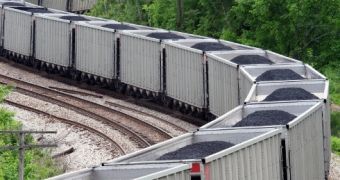Just recently, three coal trains derailed in the US, allowing rail cars to spill their contents in the areas close to where the accidents occurred.
Naturally, this lead to numerous environmentalists once again going against this industry on account of its directly and indirectly impacting on the environment.
Concerns are now raised about how building new shipping terminals for US's coal industry might lead to more than 100 million tons of this energy source being transported by rail throughout various American states on a yearly basis.
With almost 1,500 train derailments reported by the Federal Railroad Administration in 2011 alone, it is no wonder that those concerned about the environment are taking the time to ponder about what might happen should railroad traffic increase to such an extent.
E&E quotes David Lawlor from Earthjustice, who supposedly addressed this issue in a very blunt manner, “Common sense tells you sometimes trains derail. Common sense also tells you that significantly increasing train traffic will result in more derailments.”
Although representatives of the coal industry claim that, unlike chemical compounds such as liquefied petroleum gas and chlorine, coal is relatively harmless to the environment when it is not being burnt for energy, green-heads still argue that coal dust, which inevitably rises into the air as coal is manipulated, can threaten both the natural world and public health.
On the other hand, seeing that the US economy's wellbeing largely depends on the coal industry, it is quite unlikely that all coal-related activities will be put an end to simply because natural ecosystems happen to be vulnerable to their effects.
As far as we are concerned, perhaps it would be best to find ways of surpassing the coal era by investing in green energy sources.
More so since technological improvements made each day can help harvest solar, wind or geothermal energy ever more efficiently.

 14 DAY TRIAL //
14 DAY TRIAL //